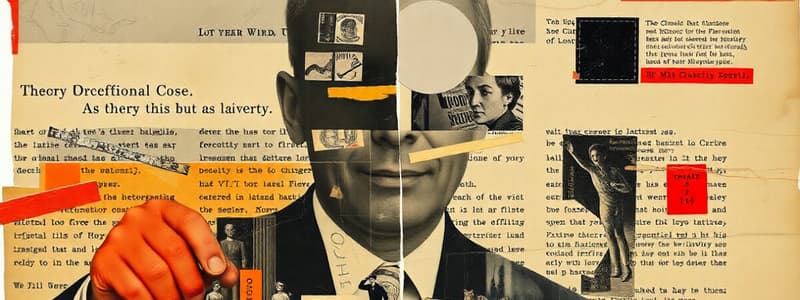Podcast
Questions and Answers
What is the primary function of innominate fraud within legal provisions?
What is the primary function of innominate fraud within legal provisions?
Innominate fraud serves as a residual umbrella offence that encompasses any form of fraud not specifically covered by other legal definitions.
How does innominate fraud differ from specific types of fraud like theft or misappropriation?
How does innominate fraud differ from specific types of fraud like theft or misappropriation?
Innominate fraud is broader and applies to any act of fraud that does not fall under defined categories, whereas theft and misappropriation have specific elements like intent and conversion.
What is required for a conviction under section 309 in relation to other fraud offences?
What is required for a conviction under section 309 in relation to other fraud offences?
A conviction under section 309 requires excluding the applicability of other fraud offences specified in the legal code.
Explain the difference in the completion of theft versus misappropriation.
Explain the difference in the completion of theft versus misappropriation.
Describe the significance of unjust gain in relation to sections 293 and 309.
Describe the significance of unjust gain in relation to sections 293 and 309.
What is the main distinction between fraud and theft?
What is the main distinction between fraud and theft?
In the context of fraud, what does 'unjust gain' refer to?
In the context of fraud, what does 'unjust gain' refer to?
What are the three main types of offences encompassed by fraud?
What are the three main types of offences encompassed by fraud?
How does deceit escalate to criminal levels in fraud cases?
How does deceit escalate to criminal levels in fraud cases?
What conditions must be present for a crime to be classified as fraud?
What conditions must be present for a crime to be classified as fraud?
In legal terms, what does the term 'misapplies' refer to?
In legal terms, what does the term 'misapplies' refer to?
What is the potential punishment for someone found guilty of misappropriation based on the outlined provisions?
What is the potential punishment for someone found guilty of misappropriation based on the outlined provisions?
Why is consent considered vitiated in cases of fraud?
Why is consent considered vitiated in cases of fraud?
What is required for a conviction under section 308 regarding obtaining money by false pretences?
What is required for a conviction under section 308 regarding obtaining money by false pretences?
Explain what is meant by 'chimerical event' in the context of fraud.
Explain what is meant by 'chimerical event' in the context of fraud.
What role does intent to deceive play in the offence of obtaining money by false pretences?
What role does intent to deceive play in the offence of obtaining money by false pretences?
How can the concept of 'unjust gain' impact the classification of an act as fraud?
How can the concept of 'unjust gain' impact the classification of an act as fraud?
In Godfrey Formosa, what must be present for deceit to have occurred?
In Godfrey Formosa, what must be present for deceit to have occurred?
Can deceit alone suffice for a fraud conviction, or must there be additional actions?
Can deceit alone suffice for a fraud conviction, or must there be additional actions?
What is meant by the term 'actus reus' in the context of obtaining money by false pretences?
What is meant by the term 'actus reus' in the context of obtaining money by false pretences?
Discuss the significance of the term 'fictitious name' in the offence of fraud.
Discuss the significance of the term 'fictitious name' in the offence of fraud.
Flashcards
Innominate fraud
Innominate fraud
A broad category of fraud that encompasses any fraudulent act not specifically defined as another type of fraud within the same legal code.
Relationship between sections 293 & 309
Relationship between sections 293 & 309
Section 309 applies only when the fraudulent act doesn't fit the criteria of any other fraud offense defined in the same legal code.
Unjust gain in fraud
Unjust gain in fraud
For a crime to be considered fraud, it must involve an intent to gain something illegally or unjustly.
Theft vs. misappropriation
Theft vs. misappropriation
Signup and view all the flashcards
False pretences
False pretences
Signup and view all the flashcards
Fraud vs. Theft
Fraud vs. Theft
Signup and view all the flashcards
Key Feature of Fraud
Key Feature of Fraud
Signup and view all the flashcards
Misappropriation
Misappropriation
Signup and view all the flashcards
Obtaining Money by False Pretences
Obtaining Money by False Pretences
Signup and view all the flashcards
Other Fraudulent Gain
Other Fraudulent Gain
Signup and view all the flashcards
Misapply in Fraud
Misapply in Fraud
Signup and view all the flashcards
Criminal Deceit
Criminal Deceit
Signup and view all the flashcards
Actus Reus of Obtaining Money by False Pretences
Actus Reus of Obtaining Money by False Pretences
Signup and view all the flashcards
Mens Rea in False Pretences
Mens Rea in False Pretences
Signup and view all the flashcards
Gain in False Pretences
Gain in False Pretences
Signup and view all the flashcards
Attempt in False Pretences
Attempt in False Pretences
Signup and view all the flashcards
Deception in False Pretences
Deception in False Pretences
Signup and view all the flashcards
Ordinary Reasonable Man
Ordinary Reasonable Man
Signup and view all the flashcards
Mise-en-Scène
Mise-en-Scène
Signup and view all the flashcards
Study Notes
Theft and Fraud - Article 261
- Theft is not defined, but our criminal code does distinguish between simple and aggravated theft.
- Determining when possession changes from one sphere to another is a factor.
- The size of an item may impact whether it constitutes theft.
- Courts refer to jurists' definitions of theft.
- Carrara defined theft as "the fraudulent taking of another's property".
Theories of Theft (Amozio, Pessina, Impallomeni)
- Amozio: Theft is complete when the offender moves the item from its original place with the intent of stealing it.
- Pessina: The item must shift from the possessor's sphere of control into the offender's sphere of control.
- Impallomeni: The taking away requires a change in the owner's sphere of control and the offender intends the final placement of the object.
Elements of the Crime of Theft
- Dolosa: The act must be intentional rather than accidental.
- Diminuto Cosa: The item must be tangible. Intangible items cannot be stolen. Moveable items only can be stolen.
- Altrui: The item must belong to someone else (res aliena).
- Invito Domino: The taking must be without the owner's consent.
Aggravated Theft (Article 261)
- Theft can be aggravated by violence, means, amount, person, place, time, or nature of the stolen item.
- Violence: Includes homicide, bodily harm, or confinement of the person; threats to harm.
- Means: Breaking and entering, using false keys, scaling are aggravated means.
- Amount: Exceeds a specified threshold in value.
- Person: Theft involving a relationship that facilitates the crime (e.g., employer-employee).
- Place: Theft committed in a church, court, or public space.
- Time: Theft committed at night (or specific times).
- Nature: Refers to specific types of objects like stolen beehives or items of significant value tied with emotions from the person (e.g., heirlooms).
Fraud (Different from Theft)
- Fraud involves deceit, a dishonest trick, to acquire something of value.
- Fraud requires an act of deception and the resulting unjust gain by the offender.
- A delivery of an item by the victim due to fraud does not make it theft.
- Fraud is about gaining something by misleading a person.
- Other types of fraud exist which are not specifically theft, such as misappropriation.
Studying That Suits You
Use AI to generate personalized quizzes and flashcards to suit your learning preferences.




